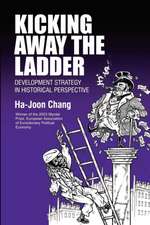Culture in Economics: History, Methodological Reflections and Contemporary Applications
Autor Sjoerd Beugelsdijk, Robbert Maselanden Limba Engleză Paperback – 29 ian 2014
| Toate formatele și edițiile | Preț | Express |
|---|---|---|
| Paperback (1) | 423.39 lei 6-8 săpt. | |
| Cambridge University Press – 29 ian 2014 | 423.39 lei 6-8 săpt. | |
| Hardback (1) | 787.78 lei 6-8 săpt. | |
| Cambridge University Press – 22 dec 2010 | 787.78 lei 6-8 săpt. |
Preț: 423.39 lei
Nou
Puncte Express: 635
Preț estimativ în valută:
81.02€ • 87.98$ • 68.06£
81.02€ • 87.98$ • 68.06£
Carte tipărită la comandă
Livrare economică 23 aprilie-07 mai
Preluare comenzi: 021 569.72.76
Specificații
ISBN-13: 9781107684614
ISBN-10: 1107684617
Pagini: 410
Ilustrații: 3 b/w illus. 12 tables
Dimensiuni: 152 x 229 x 21 mm
Greutate: 0.54 kg
Editura: Cambridge University Press
Colecția Cambridge University Press
Locul publicării:New York, United States
ISBN-10: 1107684617
Pagini: 410
Ilustrații: 3 b/w illus. 12 tables
Dimensiuni: 152 x 229 x 21 mm
Greutate: 0.54 kg
Editura: Cambridge University Press
Colecția Cambridge University Press
Locul publicării:New York, United States
Cuprins
List of figures; List of tables; List of textboxes; Prologue; Part I. Historical and Methodological Reflections on Culture in Economics: 1. Defining culture; 2. How culture disappeared from economics; 3. Explaining the rise of culture in modern economics; 4. Culture in economics: contemporary theoretical perspectives; 5. A methodological perspective on culture in economics; Part II. Applications of Culture in Contemporary Economics: Introduction to Part II; 6. Entrepreneurial culture; 7. Trust; 8. International business; 9. Comparative corporate governance; Part III. Evaluation: 10. Discussion; References; Index.
Recenzii
'This important new book on culture in economics by Sjoerd Beugelsdijk and Robbert Maseland is most welcome. It fills an important gap in the literature that has only recently been recognised. After decades of sceptical methodological isolationism, economists have come to accept that without reference to people's systems of norms and beliefs a large part of the differences in performance across populations would go unexplained. I strongly recommend this book to anyone interested in truly understanding economics.' Luigi Guiso, Professor of Economics, European University Institute
'Economic science has its roots in Anglo-American cultural values. With an increasing share of world economic power slipping out of Western hands, there is a crying need for an economic science in which cultural values are treated as a variable. [This] book by Beugelsdijk and Maseland is a welcome contribution to this development.' Geert Hofstede, author of Culture's Consequences
'A new literature in economics has rediscovered fundamental insights in sociology and is using them to address long standing economic problems. This book does a superb job in placing this new line of research in a broader context, explaining its deep roots and how it opens up fundamental methodological issues. A very timely book that will have a lasting impact on one of the most exciting areas of research in the social sciences.' Guido Tabellini, Professor of Economics, Bocconi University
'Economic science has its roots in Anglo-American cultural values. With an increasing share of world economic power slipping out of Western hands, there is a crying need for an economic science in which cultural values are treated as a variable. [This] book by Beugelsdijk and Maseland is a welcome contribution to this development.' Geert Hofstede, author of Culture's Consequences
'A new literature in economics has rediscovered fundamental insights in sociology and is using them to address long standing economic problems. This book does a superb job in placing this new line of research in a broader context, explaining its deep roots and how it opens up fundamental methodological issues. A very timely book that will have a lasting impact on one of the most exciting areas of research in the social sciences.' Guido Tabellini, Professor of Economics, Bocconi University
Notă biografică
Descriere
Shows how economists address values and norms in theory and empirical research, highlighting opportunities and challenges for the future.















